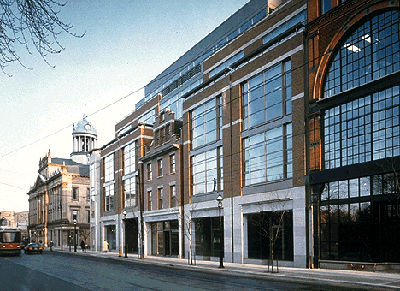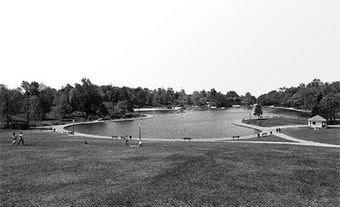Kuwabara Payne McKenna Blumberg Architects (KPMB) was founded in 1987 by the four partners: Bruce Kuwabara, Thomas Payne, Marianne McKenna and Shirley Blumberg, all former associates of Barton Myers Architects.
Major Public Commissions
KPMB has become recognized as one of Canada's leading architectural practices. The firm has won important design competitions for public buildings in Canada including the Art Gallery of Ontario Stage III Expansion (a joint venture with Barton Myers Associates, built in 1987–93), the new Kitchener (Ontario) City Hall (built in 1990–93), and the Joseph E. Stauffer Library at Queen's University in Kingston (built in 1992–94).

Design Portfolio
KPMB has a national as well as international presence. Working from their headquarters in Toronto, Ontario, they have a unique model of practice that is based in collaborative and integrated design work processes. The firm believes in contextually responsive architecture, and designs across a wide range of scale including: cultural, educational, healthcare, urban development, and high performance sustainable buildings. Aesthetically their buildings often play with a contrast of wood, steel and glass, creating elegant structures that pay particular attention to creating public spaces.
Design Sensibilities
KPMB’s work is characterized by sensitivity to context, the bold use of materials, elegant design and expertise in urbanity. Because of the strong and individual talents of each of the four partners, buildings reflect the design interests and preoccupations of the partner-in-charge of design. For example, the Joseph S. Stauffer Library design (Thomas Payne) is marked by references to the gothic buildings on the campus, but interpreted and adapted to the contemporary needs of the university. The Kitchener City Hall (Bruce Kuwabara) is conceived as a hybrid of spaces and volumes expressing the importance of location, topography, building program and context in clear architectural terms.

King James Place (Shirley Blumberg) and the Tudhope Offices (Marianne McKenna) each respond to the urban context of Toronto and incorporate existing commercial buildings, but do so in a contrasting manner. In the case of King James Place, an important historic facade is preserved and framed by flanking buildings whose scale and modulation subtly respond to the existing historic streetscape. In the Tudhope project, the existing building is transformed to respond to a new program. New elements — metal lintels and infill panels — are clearly differentiated from existing fabric, but harmonized with the old building to create a strong composition.
Innovative Design
One of the most recognized KPMB projects, Canada’s National Ballet School (built in 2005), has received awards across the board, ranging from the Royal Architectural Institute of Canada Governor General’s Award, American Institute of Architecture’s Gold Medal, International Architecture Awards, National Urban Design Award and the Ontario Architects Association Excellence awards for the successful integration of a heritage building with a contemporary architectural complex. This project is a dance school, an educational facility and a residence. The feature component of this it is the s-storey vertical North Tower with floor-to-ceiling glazing along the main street that displays the practice spaces for the dancers to the city. Furthermore, a series of in-between spaces allow for students to relax, stretch or socialize, encouraging a balanced approach to education at this facility, showing the innovation of dance as well as its culture.

Sustainable Design
The design of the 10-storey chronic care hospital Bridgepoint Health (built in 2013) is a great example of KPMB’s ability to work with a complex urban problem and bring a sense of human scale to it. The building is monumental in scale, taking up to over 10 acres of land, incorporating parts of the historic Don Jail, with details that are soft and subtle via the detailing of wood, colour and integrated green spaces. The building celebrates the public by giving access to an “Urban Porch” that includes a cafe, auditorium, library and terrace. Bringing the public into the building is a strategy often employed by KPMB, allowing for a transparency between building and the site it occupies. This sort of gesture can also be seen in the TIFF Bell Lightbox (built in 2010) project where the use of a metal-lined and lit canopy at street level connects passersby to the building, creating a welcoming and intimate effect, connecting cafe, restaurant and a lounge to the public. Furthermore, the building is finished in glass panels, zinc cladding and metal details. The building has a five-storey podium, and a 42-storey condominium tower. The integration of two programs is seamlessly blended into the building with the sweep of the roof line. The plan is inspired by industrial loft buildings and hence the building is full of large volume spaces injected with smaller programs like the master control room that appears as if it floats in the middle of the central atrium space painted in red.
Thomas Payne left KPMB in 2013 after 25 years as a founding and senior partner in order to pursue independent projects.
Awards
KPMB’s work has won the firm a variety of awards, highlighting the breadth of their expertise. The prestigious Governor General Awards of Excellence from the Royal Architectural Institute of Canada have been awarded to KPMB for Woodsworth College at the University of Toronto (1992), for Kitchener City Hall (1994),Richmond City Hall (2002), James Stewart Centre for Mathematics for McMaster University (2004),Canada’s National School of Ballet (2008) Vaughan City Hall (2012), CIGI (2014), and two awarded in 2014 for Joseph L. Rotman School of Management Expansion at the University of Toronto. Furthermore, Governor General's Awards of Merit have been awarded for Woodsworth College at the University of Toronto and for King James Place in downtown Toronto (1992), and for Kitchener City Hall and a private residence in Richmond Hill (awarded 1994). As well, in 1997, the Design Exchange Building (built in 1994), Grand Valley Institute for Women (built in 1996), and Joseph S. Stauffer Library (built in 1994) were recognized for their merit. Another important building example is Manitoba Hydro, a significant project showing their efforts to advance sustainable design agenda in architecture. It is ranked as LEED Platinum, the highest achievement in sustainability. This project is one of the most awarded projects that the firm has, having been acknowledged 16 times with various prestigious awards. Other awards have also been granted to the firm outside of Canadian borders as well, namely by the American Institute of Architects, Architectural Record Good Design is Good Business, and the Urban Land Institute to name a few. The firm is also involved in the academic context, with several universities and colleges.

 Share on Facebook
Share on Facebook Share on X
Share on X Share by Email
Share by Email Share on Google Classroom
Share on Google Classroom




